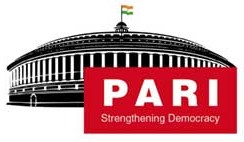- Jan 2017
By Dr. Narmadeshwar Prasad
- [Director, Parliamentary & Administrative Research Institute (PARI)]
After Mr. Narendra Modi took over as the Prime Minister of India, expectations on several fronts, including parliamentary reforms rose. The status quoist attitude of the previous governments influenced people’s thinking and turned Indian bureaucracy lethargic.The change of power happened in 2014 on the promise of change. It took around two years to bring the goods and services tax preliminary legislation on track, which will be a landmark reform in our indirect taxation system. The Planning Commission gave way to Niti Aayog thus reducing one major wall between the people of states and the Centre. On the Parliamentary front, the promise to approve the national budgetary grants before March 31, 2016 will go down in the annals of history as major reform with far-reaching implications. Passing general budgets before March 31 would mean no ‘vote on account’ – no delay in implementation of developmental projects and thus no loss in revenue collection.
Vote on Account
Vote on account had become an integral part of our budgetary exercise. The concept entails a special provision given to the Indian Government to obtain the vote of parliament to withdraw money when the budget for the new financial year is not released or elections are underway, and the caretaker government is in place.
In simple terms, Article 266 of the Constitution makes it mandatory for the Indian Government to seek approval from the parliament before raising any funds from the consolidated funds of India. The vote on account represents the expenditure side of the government’s budget; i.e. government gives the estimate of the funds required during the first two months of the financial year. It stays valid for two months which can be extended if the year is an election year and it is anticipated that the main demand and the appropriation bill will take longer to be passed by the House.
It is very clear from the above definition that vote on account should be applicable only in an election year i.e. once in five years or when there is a caretaker government in place. However, the practice of vote on account became a regular feature in the normal years too. Additionally, the period of vote on account sometimes extended even beyond two months.
Projects forced to wait
During the period of vote on account, the ministries/departments can only use the funds meant for the expenditure side i.e. salary disbursements, loan interests and other non-plan expenses, meaning thereby no new projects would be taken up till the budget is finally passed by the Parliament and individual notices/communications are received by the ministries/departments which takes around two to three months. Thus the nation loses crucial time every year on development works as no project is initiated or built upon during this period. The bureaucracy also postpones every new initiative and waits for the final passage of the budget.
One of the essential features of a vote on account is that it cannot alter the tax proposals since the Financial Bill needs to be passed by the Parliament. Which means the nation loses financially also as the altered taxes though proposed in the budget documents, but can not be implemented for two to three months which amounts to a loss of around 1/3rd of the revenue in a year. The last minute rush of spending the budgets allocated to the Centre and state level governments have resulted in many anomalies at the cost of the beneficiaries. Many a time budgets get reduced due non-spending of the full amount in a financial year.
The Proposed reform and its impact
As proposed by the new Government, the budget for 2017-18 will be presented in the Parliament on February 1, 2017. It will be given 30-40 days scrutiny by the Department-related Parliamentary Standing Committees which examine the individual demands for grants thread-bare and give their reports to the Parliament. Earlier this process used to spill over to April end and sometimes early May and hence the vote on account was needed. Once the entire budget exercise gets over by March 31, there will be no need for a vote on account and the government can straightway start implementing projects from April 1.
This will also not leave any excuse to the bureaucracy for delaying the project. On an average the efficiency of the government was 75 per cent and an equal proportion of revenue was collected. Now the time available for implementation of all the projects will be the full 12 months and the revenue collection will also be 100 per cent.
Conclusion
The crucial time lost due to vote on account earlier will now be available with the government for implementation of many social projects in the states and it will usher in a new era. This will also put a stop to the last minute rush of spending the budgets allocated to the Centre and state level governments. Many such reforms are needed to make the parliamentary democracy a success and turn the common people of the country into beneficiaries.




